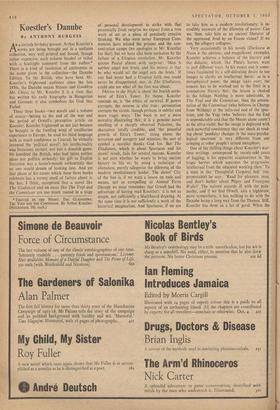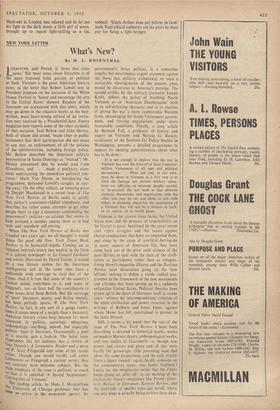Koestler's Danube
By ANTHONY BURGESS As a sixtieth birthday present, Arthur Koestler's works are being brought out in a uniform collection, very well printed and bound, though rather expensive, each volume headed or tailed with a hindsight comment from the author.* There is a kind of resolution of antinomies in the name given to the collection—the Danube Edition. To the British, who have been Mr. Koestler's frightened audience since the late 1930s, the Danube means Strauss and Goodbye Mr. Chips; to Mr. Koestler it is a river that has written his early biography in Hungarian and German; it also symbolises the God that Failed.
These three books—two novels and a volume of essays—trlong to the end of the war and the period of Orwell's perceptive article on Koestler. Koestler frightened us not just because he brought in the freeing wind of totalitarian experience in Europe; he used his third language with as much confidence as Conrad; he virtually invented the 'political novel'; his intellectuality was ferocious, earnest, not just a donnish game. He humbled the British, who had taken neither ideas nor politics seriously; his gift to English literature was a horse's-mouth authenticity that nc one would dream of looking into. And yet that phase of his career which these three books celebrate has a strong smell of failure about it. He has, I think, recognised that a novel like The Gladiators and an essay like The Yogi and the Commissar are too much rooted in a stage * THIEVES IN THE NIGHT; THE GLADIATORS; THE YOGI AND THE COMMISSAR. By Arthur Koestler. (Hutchinson, 30s. each.) of personal development to strike with that perennially fresh surprise we expect from a true work of art or a piece of genuinely creative thinking. We who were never European Com- munists have missed the prisons and the con- centration camps (we apologise to Mr. Koestler for that), but we have also been unshaken by the failure of a Utopian revolution. Mr. Koestler quotes Pascal almost with surprise: 'Man is neither angel nor brute, and his misery is that he who would act the angel acts the brute.' If one had never had a Utopian faith one could never be disappointed, nor, in The Gladiators, could one see what all the fuss was about.
Thieves in the Night is about the Jewish settle- ment of Ezra's Tower. Its theme, Koestler reminds us, is 'the ethics of survival. If power corrupts, the reverse is also true: persecution corrupts the victim, though perhaps in subtler and more tragic ways.' The book is not a mere morality illustrating this; it is a genuine novel smelling of a sharply observed Palestine, the characters totally credible, and 'the peaceful growth of Ezra's Tower,' rising above the terrorism and savagery and injustice, the sort of symbol a novelist thanks God for. But The Gladiators, which is about Spartacus and his slaves' revolt, fails for several reasons. Koestler is not sure whether he wants to bring ancient history to life or, by using a technique of alienation, merely allegorise the dilemma of the modern revolutionary leader. The slaves' City of the Sun is, if we want a lesson on ends and means, not so compelling as Animal Farm (though we must remember that Orwell had the . advantage of hiving read Koestler): it is not so simple, not sufficiently a blackboard drawing. At the same time it is not sufficiently a work of the historical imagination. And Spartacus, if we are to take him as a modern revolutionary, is in- credibly unaware of the dilemma of power. Can we, then, take him as an ancient liberator of the oppressed, fired by an Essene vision? If we can, the allegory collapses.
Very occasionally in his novels (Darkness at Noon is the obvious, and magnificent, example), Koestler achieves a balance of the literary and the didactic, which, like Plato's horses, want to pull different ways. In his essays one is some- times fascinated by a self-defeating desire to use images to clarify an intellectual thesis : as in a metaphysical poem, the image takes over; the conceit has to be worked out to the limit in a compulsive literary lUst; the lesson is choked in the foliage. Nothing is more admirable, in The Yogi and the Commissar, than the presen- tation of the Commissar (who believes in Change from Without) at the infra-red end of the spec- trum, and the Yogi (who 'believes that the End is unpredictable and that the Means alone count') at the ultra-violet. But the image is deployed with such powerful consistency that our shock at read- ing about 'pendular changes in the mass-psycho- logical spectrum' is very different from our cringing at other people's mixed metaphors.
One of the chilling things about Koestler's war- time writings, untempered by twenty-odd years of lagging, is his apparent acquiescence in 'the tragic barrier which separates the progressive intellectual from the educated working class.' To a man in the 'Thoughtful Corporal belt' (un- promotable) he says: 'Read for pleasure, man, and don't bother about Peguy and Finnegans Wake!' The naiveté accords ill with the poly- mathy, and if we find Orwell, also a highbrow, more sympathetic, it has nothing to do with the Danube being a long way from the Thames. Still, Koestler has done us a lot of good. When the
black-out in London was relaxed and he let out his light to the dark street, a little girl of seven, brought up to regard light-spilling as a sin, sobbed: 'Uncle Arthur does not believe in God.' Such Yogi-ethical outbursts are the price he must pay for being a light-bringer.







































 Previous page
Previous page